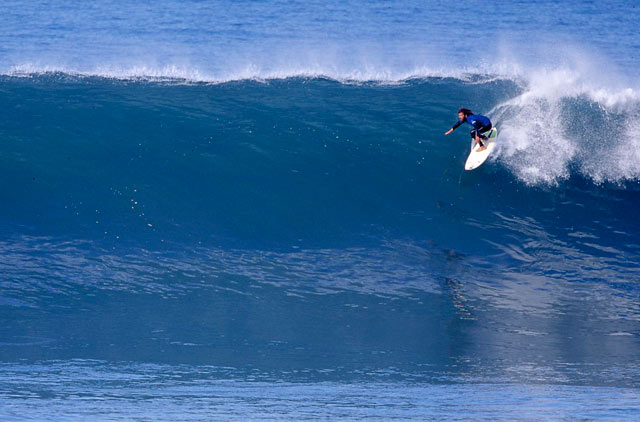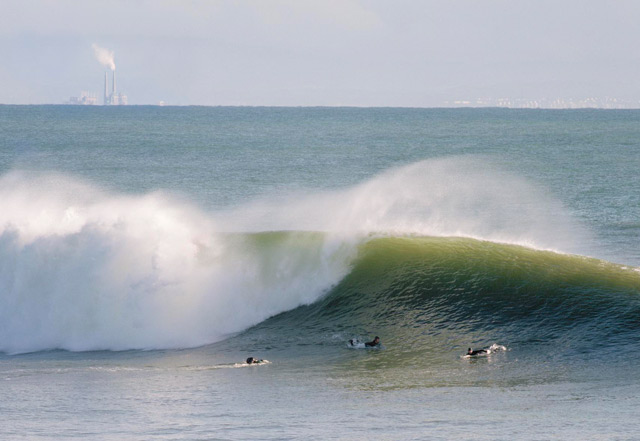Protecting the World’s Best Rollers
Santa Barbara's Will Henry and His Save The Waves Coalition

Yosemite’s iconic Half Dome is to rock climbers what Rincon Point is to surfers — a place of unbridled beauty and internationally celebrated perfection. However, while Yosemite sits on a vast expanse of permanently protected government land, Rincon, despite its lofty status, remains very much vulnerable to ruin at the hand of man. Should a threat be posed to Rincon Point’s surf break, what can be done to fight to protect the wave? How will the community ensure that one of the world’s most famous and spectacular waves is kept from extinction?

Enter Save The Waves (STW), a worldwide watchdog on the lookout for surf breaks teetering on the brink of destruction with the singular purpose of protection. For the past decade, STW has been building a résumé of success, its members’ efforts helping chalk up victories for embattled surf breaks in Mexico, Nicaragua, Ireland, and Spain. Working as a facilitator between various surf-minded organizations, STW helps give voice to wave-preservation efforts in communities big and small to such a degree that, when the group succeeds, the importance of the “saved” surf spot is recognized from the local government level all the way to the United Nations. Now, our beloved Rincon Point, the Queen of the Coast who calls the Santa Barbara/Ventura County line home, is on their protection radar.
Santa Barbara’s Will Henry, an avid photographer and surfer who first fell in love with the Queen during his days at Carpinteria’s Cate School, founded Save The Waves in 2001 after running headfirst into what exactly the potential death of world-class waves looks like. Henry had made numerous visits throughout the late 1990s to the surf-rich island of Madeira, an unspoiled point-break paradise with European comforts (the archipelago is technically part of Portugal) and warm water off the northwest coast of Morocco. A relatively new surf discovery, the magic of Madeira and the healthy supply of powerful Atlantic Ocean swells instantly had Henry transfixed.
However, during a return trip in 2001, Henry arrived to find a growling bulldozer at Lugar de Baixo, a hollow and occasionally perfect right-hand point. “I recall pulling up to this pristine coastline only to see giant rocks being begrudgingly dragged off of the shore in an effort to build a seawall,” Henry remembers with disturbed urgency. As it turned out, a marina was being built right on top of the wave, and a small group of Madeira locals, outraged by the sure destruction of their surf spot, were essentially powerless to stop it.
“For me, this was unacceptable. I went back home to California, and I practically couldn’t sleep at night thinking about this beautiful wave that was going to be gone, the natural shoreline that was being obliterated,” said Henry. As a direct response to the situation in Maderia, Save The Waves was born. Soon enough, Henry returned to Madeira to help fight the project, and, after lengthy struggles with government officials, the marina was moved. However, the victory was, as Henry called it, bittersweet, for the seawall remained, and the wave at Lugar de Baixo has never been the same.

In the years since its founding, STW has engaged in collaboration with numerous coastal-preservation nonprofits, including the Surfrider Foundation and Surfers Against Sewage, not only to bring together marine-focused scientific minds toward supporting the surfing community, but also to show the world what a wave is worth in both social and economic terms, as well as to serve as a call to action to create a united global web of protection.
Yvon Chouinard, founder of Patagonia, and the nonprofit 1% for the Planet, has been an instrumental supporter of STW. “They create World Heritage Sites, like Yosemite,” Chouinard said, “Why not have them for surf spots, so that the whole world sees the value of them and wants to protect them? There are very few famous great surf breaks, and these, including Rincon, should be formally recognized worldwide.”
UNESCO (United Nations Educational, Scientific, and Cultural Organization) lists World Heritage Sites as being of special cultural or physical significance. These special places are protected on an international level, as conserving them is in the interest of the global community of humanity.
Fighting for wave preservation and subsequent connected activities during the past decade has resulted in one of the most influential and proactive projects organized by Save The Waves to date — the World Surfing Reserves (WSR) program. An idea inspired by Chouinard, WSR identifies, designates, and preserves outstanding waves, surf zones, and their surrounding environments around the world. Serving as a global model based upon the World Heritage Sites procedures, it also calls upon the grassroots approach at a local level to take each important surfing wave from nomination to WSR fruition (Malibu was the first designated World Surfing Reserve in October 2010). Along with key partners National Surfing Reserves (NSR) Australia and the ISA (International Surfing Association), STW plans for these enshrinements to serve as a “UNESCO of surfing.”
If Rincon is to become a WSR, an area stewardship council needs to be formed to submit an application, which is available on the Save The Waves Web site (savethewaves.org).
4•1•1
For more information on the WSR Program, visit savethewaves.org.



